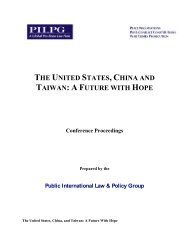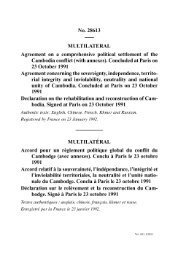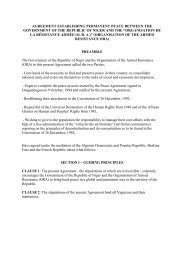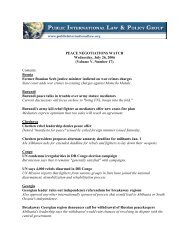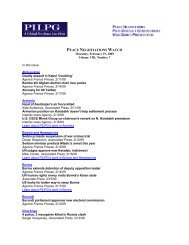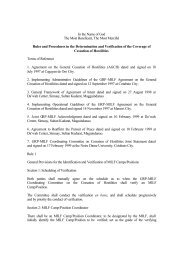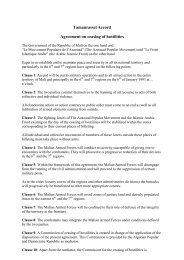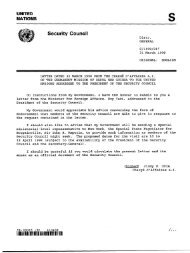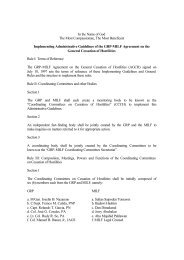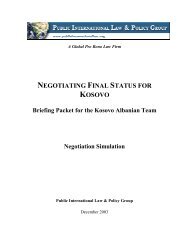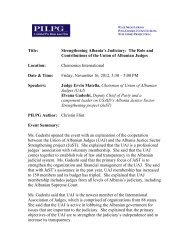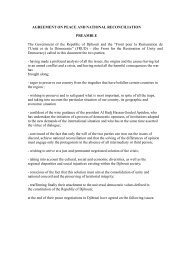You also want an ePaper? Increase the reach of your titles
YUMPU automatically turns print PDFs into web optimized ePapers that Google loves.
20<br />
intended as the first step in a serious campaign against major Albanian organized crime<br />
kingpins.<br />
A serious and successful campaign against organized crime would only be welcomed by<br />
the Kosovo Albanian people who, after all, are its chief victims. An ex-KLA contact,<br />
with an astonishing insight into the seamy secrets of the pre-and post-war Albanian<br />
armed underworld, told me that one of the three KLA figures detained by the<br />
international police was a notorious serial rapist of Albanian women. This contact and<br />
others, however, told me that the problem of organized crime in Kosovo is not<br />
exclusively—or possibly even primarily—one of the ex-KLA. If international efforts<br />
against organized crime focus only on the ex-KLA they will fail to address the crime<br />
problem and alienate both ex-KLA figures and the broader Kosovo Albanian population,<br />
which has no particular love for organized crime but which regards the KLA as the leader<br />
of a justified national liberation struggle against Serb oppression.<br />
Veton Surroi told me he thought the problem of organized crime was the biggest threat to<br />
a democratic and prosperous future for Kosovo. According to Surroi, however, the major<br />
organized crime groups are only partially traceable to the KLA. The real crime powers,<br />
Surroi contended, go back to pre-1999 war Albanian criminal groups, which then had and<br />
probably still have today close ties with Serbian criminal groups, including those close to<br />
the Serbian police and military. Surroi called these groups "kontrabandisti" apparently<br />
because many of them were involved in smuggling (and sanctions-busting) even before<br />
the 1999 war. He said that these groups are now trying to "go legit," in some cases by<br />
moving into the media and politics.<br />
A knowledgeable Albanian source described to me in broad terms the activities of one<br />
such group, the Luka clan, based in Pec. This group, part family and part business group,<br />
engaged in a broad range of criminal and legitimate activities before the 1999 war,<br />
including cigarette and other smuggling and printing. The Luka clan has established a<br />
well-funded broadcast company, called Djukadjin, which is seeking a license to open a<br />
new private Kosovo-wide TV station. Djukadjin TV would be a powerful competitor to<br />
Surroi's TV station, Koha Vision which still depends in part on aid from George Soros.<br />
Djukadjin also reportedly hired away Baton Hadjiu, the former editor of Surroi's<br />
newspaper, Koha Ditore, which may account in part for Surroi's concern about the<br />
growing influence of "kontrabandisti."<br />
Kosovo Protection Corps<br />
What to do about the Kosovo Protection Corps (KPC), the 5,000 strong quasi-military<br />
emergency response force set up after the 1999 war to provide a home for KLA veterans,<br />
is one of those potentially explosive issues the international community is currently<br />
ignoring. In a meeting with KPC Commander, Lt. Gen. Agim Ceku, I found him<br />
concerned—almost angry—about the international community's approach toward the<br />
KPC. Ceku said bluntly that the international community needs to do more to support the<br />
KPC, both financially and with equipment, to allow it to carry out its existing mission. It<br />
also needs to help the KPC begin to evolve its structure and mission in accord with the



